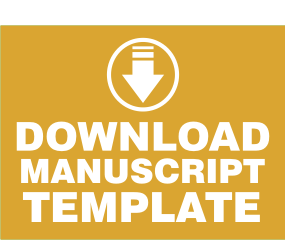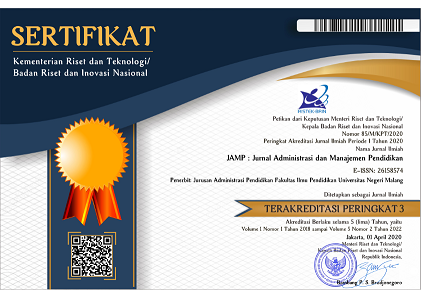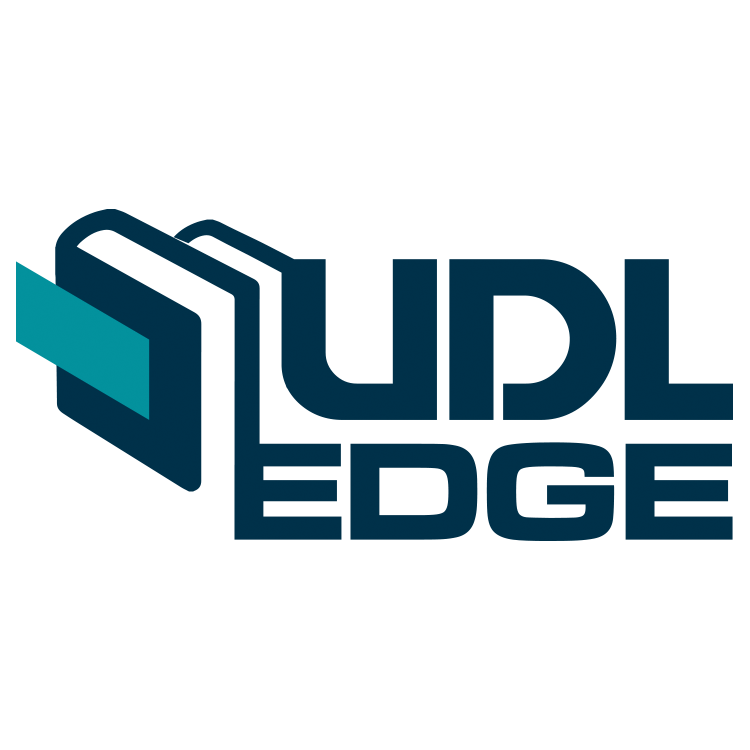Analisis Kesiapan Mahasiswa dalam Mengikuti Pembelajaran Sistem Hibrid
Abstract
Abstract: This study aims to identify the factors of student readiness in participating in hybrid system learning. A quantitative approach, with an explanatory design, was used to answer the aforementioned research objectives. The population in this study were students of the Faculty of Education, Universitas Negeri Malang, with a total sample of 346 students, which were analyzed using descriptive analysis. Based on the results of the study, the factors studied, namely health conditions showed a tendency at the level of good criteria, understanding of the implementation of hybrid learning was in the criteria of understanding, the lifestyle of the majority of students living in boarding houses/rented and mobility using private vehicles during college, the application of health protocols was on the frequent criteria, students' perceptions of hybrid lectures are good, parental support shows a supportive tendency, and students' readiness to take hybrid lectures is on the supportive criteria.
Keywords: Hybrid learning; higher education; student readiness; Covid-19
Abstrak: Penelitian ini bertujuan untuk mengidentifikasi faktor-faktor kesiapan mahasiswa dalam mengikuti pembelajaran sistem hibrid. Pendekatan kuantitatif, dengan explanatory design, digunakan untuk menjawab tujuan penelitian yang telah disebutkan. Populasi dalam penelitian ini adalah mahasiswa Fakultas Ilmu Pendidikan, Universitas Negeri Malang, dengan jumlah sampel sebanyak 346 mahasiswa, yang dianalisis menggunakan analisis deskriptif. Berdasarkan hasil penelitian menunjukkan faktor-faktor yang diteliti yakni kondisi kesehatan menunjukkan kecenderungan pada tingkat kriteria baik, pemahaman pelaksanaan hybrid learning berada pada kriteria paham, gaya hidup mahasiswa mayoritas bertempat tinggal di kos/kontrakan dan mobilitas menggunakan kendaraan pribadi selama berkuliah, penerapan protokol kesehatan berada pada kriteria sering, persepsi mahasiswa terhadap perkuliahan hybrid baik, dukungan orang tua menunjukkan kecenderungan mendukung, dan kesiapan mahasiswa mengikuti perkuliahan hybrid berada pada kriteria mendukung.
Kata kunci: Hybrid learning; perguruan tinggi; kesiapan mahasiswa; Covid-19Full Text:
PDFReferences
Adedoyin, O. B., & Soykan, E. 2020. Covid-19 Pandemic and Online Learning: the Challenges and Opportunities. Interactive Learning Environments, 1–13. https://doi.org/10.1080/10494820.2020.1813180
Adha, M. A., Ariyanti, N. S., Darmaji, D., & Sunandar, A. 2020. Parents Communication Pattern for Schools in the Management of Students with Special Needs. 4th International Conference on Education and Management (CoEMA 2019), 381, 56–59. https://doi.org/10.2991/coema-19.2019.13
Adha, M. A., Ariyanti, N. S., Mustiningsih, Maisyaroh, & Bafadal, I. 2020. Analysis of Success Factors Implementation of Computer-Based Management Information System in Higher Education. 1st International Conference on Information Technology and Education (ICITE 2020), 508(Icite), 80–85. https://doi.org/https://dx.doi.org/10.2991/assehr.k.201214.217
Anggraeni, S. A., Amelia, I., Wulandari, P., Oktavianingrum, R., Adha, M. A., Gunawan, R. M., & Juharyanto. 2020. The Efforts of School Principal in Improving Quality of Learning Through Non-Thematic Learning Supervision in Elementary School. Proceedings of the 6th International Conference on Education and Technology (ICET 2020) The, 346–350. https://doi.org/https://dx.doi.org/10.2991/assehr.k.201204.067
Arifin, I., Juharyanto, Adha, M. A., Shofa, A. M. A., Rahmania, L. A., & Mokhtar, M. 2022. Antecedents of Leadership Strength Toward Teacher Self-Efficacy for Online Learning Quality Based on COVID-19 Pandemic. 2022 2nd International Conference on Information Technology and Education (ICIT&E), 5–11. https://doi.org/10.1109/ICITE54466.2022.9759896
Aristovnik, A., Keržič, D., Ravšelj, D., Tomaževič, N., & Umek, L. 2020. Impacts of the COVID-19 pandemic on life of higher education students: A global perspective. Sustainability (Switzerland), 12(20), 1–34. https://doi.org/10.3390/su12208438
Ariyanti, N. S., Adha, M. A., Imron, A., Sobri, A. Y., & Bafadal, I. 2020. School Relations Strategy with the Community through the Utilization of Online Applications in the Digital Era. 1st International Conference On Information Technology And Education (ICITE 2020), 508(Icite), 93–97. https://doi.org/https://dx.doi.org/10.2991/assehr.k.201214.219
Bao, W. 2020. COVID ‐19 and Online Teaching in Higher Education: A Case Study of Peking University. Human Behavior and Emerging Technologies, 2(2), 113–115. https://doi.org/10.1002/hbe2.191
Bedair, S., Sayed, S. A., & Almetwaly, W. M. 2022. Enhancing Hybrid Learning using Open Source GIS-Based Maps Archiving System. The Egyptian Journal of Remote Sensing and Space Sciences, 25(3), 779–793. https://doi.org/10.1016/j.ejrs.2022.07.003
Bhute, V. J., Sengupta, S., Campbell, J., Shah, U. V., Heng, J. Y. Y., & Brechtelsbauer, C. 2022. Effectiveness of a Large-Scale Implementation of Hybrid Labs for Experiential Learning at Imperial College London. Education for Chemical Engineers, 39(March), 58–66. https://doi.org/10.1016/j.ece.2022.03.001
Blau, I., & Shamir-Inbal, T. 2017. Digital competences and long-term ICT integration in school culture: The perspective of elementary school leaders. Education and Information Technologies. https://doi.org/10.1007/s10639-015-9456-7
Che Ahmad, C. N., Shaharim, S. A., & Abdullah, M. F. N. L. 2017. Teacher-Student Interactions, Learning Commitment, Learning Environment and Their Relationship with Student Learning Comfort. Journal of Turkish Science Education, 14(1), 57–72. https://doi.org/10.12973/tused.10190a
Edelhauser, E., & Dima, L. L. 2020. Is Romania Prepared for E-Learning During the COVID-19 Pandemic? Sustainability (Switzerland), 12(13), 1–29. https://doi.org/10.3390/su12135438
Garad, A., Al-Ansi, A. M., & Qamari, I. N. 2021. The Role of E-learning Infrastructure and Cognitive Competence in Distance Learning Effectiveness During the Covid-19 Pandemic. Cakrawala Pendidikan, 40(1), 81–91. https://doi.org/10.21831/cp.v40i1.33474
Garbe, A., ogurlu, U., Logan, N., & Cook, P. 2020. Parents’ Experiences with Remote Education during COVID-19 School Closures. American Journal of Qualitative Research. https://doi.org/10.29333/ajqr/8471
Garg, K., Mishra, S., Raheja, A., Verma, S., Tandon, V., Agrawal, S., Suri, A., Chandra, P. S., Prada, F., Servadei, F., Kale, S. S., & Srivastava, P. 2022. Hybrid Workshops During the COVID-19 Pandemic—Dawn of a New Era in Neurosurgical Learning Platforms. World Neurosurgery, 157, e198–e206. https://doi.org/10.1016/j.wneu.2021.09.132
Graham, C. G., & Allen, S. 2011. Designing Blended Learning Environments. In Encyclopedia of Distance Learning, Second Edition. Idea Group Inc. https://doi.org/10.4018/978-1-60566-198-8.ch082
Hediansah, D., & Surjono, H. 2020. Hybrid Learning Development to Improve Teacher Learning Management. JKTP: Jurnal Kajian Teknologi Pendidikan, 3(1), 1–9. https://doi.org/10.17977/um038v3i12019p001
Hwang, A. 2018. Online and Hybrid Learning. Journal of Management Education, 42(4), 557–563. https://doi.org/10.1177/1052562918777550
Juharyanto, Sultoni, A., Nasih, A. M., Zahro, A., Priyatni, E. T., & Adha, M. A. 2021. Professional Teachers ’ Capability in the Implementation of Online-Based Quality Learning in Covid 19 Pandemic Era : Analysis of Technology Infrastructure Support in Indonesia. Jurnal Pendidikan: Teori, Penelitian, Dan Pengembangan, 6(12), 1923–1929. http://journal.um.ac.id/index.php/jptpp/article/view/15171/6598
Kari, M. L., Bare, Y., Yoseph, O., & Mago, T. 2021. Blended Learning Dengan Memanfaatkan Aplikasi Microsoft Teams. Qalam: Jurnal Ilmu Kependidikan, 10(2), 63–72. https://ejournal.um-sorong.ac.id/index.php/jq/article/view/1418/855
Kim, Y., Montoya, E., Doocy, S., Austin, L. J. E., & Whitebook, M. 2022. Impacts of COVID-19 on the Early Care and Education Sector in California: Variations across program types. Early Childhood Research Quarterly, 60, 348–362. https://doi.org/10.1016/j.ecresq.2022.03.004
Lee, J. T., Sean Hu, S., Zhou, T., Bonner, K., Kriss, J. L., Wilhelm, E., Carter, R. J., Holmes, C., de Perio, M. A., Lu, P., Nguyen, K. H., Brewer, N. T., & Singleton, J. A. 2022. Employer Requirements and COVID-19 Vaccination and Attitudes among Healthcare Personnel in the U.S.: Findings from National Immunization Survey Adult COVID Module, August – September 2021. Vaccine, September 2021. https://doi.org/10.1016/j.vaccine.2022.06.069
Mahmud, R. 2021. Blended Learning Model Implementation in the Normal, Pandemic, and New Normal Era. Proceedings of the 5th Progressive and Fun Education International Conference (PFEIC 2020), 479(Pfeic), 130–139. https://doi.org/10.2991/assehr.k.201015.021
Maisyaroh, M., Juharyanto, J., Bafadal, I., Wiyono, B. B., Ariyanti, N. S., Adha, M. A., & Qureshi, M. I. 2021. The Principals’ Efforts in Facilitating the Freedom to Learn by Enhancing Community Participation in Indonesia. Cakrawala Pendidikan, 40(1), 196–207. https://doi.org/https://doi.org/10.21831/cp.v40i1.36119
Maisyaroh, Ulfatin, N., Juharyanto, Prestiadi, D., Adha, M. A., Ariyanti, N. S., Saputra, B. R., & Sjaifullah, F. W. 2021. Mentoring Teachers in the Utilization of Moodle E-Learning Application to Optimize Learning Success. 2021 7th International Conference on Education and Technology (ICET), 19–23. https://doi.org/10.1109/ICET53279.2021.9575083
Mastura, & Santaria, R. 2020. Dampak Pandemi Covid-19 terhadap Proses Pengajaran bagi Guru dan Siswa Pendahuluan. Jurnal Studi Guru Dan Pembelajaran, 3(2), 289–295.
Mulyono, H., Ismayama, D., Liestyana, A. R., & Komara, C. 2021. Efl Teachers ’ Perceptions of Indonesian Blended Learning Course Across Gender and Teaching Levels. Teaching English with Technology, 21(1), 60–74. https://files.eric.ed.gov/fulltext/EJ1283385.pdf
Nguyen, H. H., Tuong, H. A., Hoang-Thi, M., & Nguyen, T. Van. 2022. Factors Influencing Online Learner Performance During Coronavirus Disease Pandemic: A Case Study in Vietnamese Universities. European Journal of Educational Research, 11(3), 1509–1522. https://doi.org/10.12973/eu-jer.11.3.1509
Nurabadi, A., Suhariadi, F., Mardiyanta, A., Triwiyanto, T., & Adha, M. A. 2022. Digital Principal Instructional Leadership in New Normal Era. International Journal of Evaluation and Research in Education (IJERE), 11(3), 1090–1098. https://doi.org/10.11591/ijere.v11i3.22483
Onyema, E. M., Eucheria, N. C., Obafemi, F. A., Sen, S., Atonye, F. G., Sharma, A., & Alsayed, A. O. 2020. Impact of Coronavirus Pandemic on Education. Journal of Education and Practice, 11(13), 108–121. https://doi.org/10.7176/jep/11-13-12
Sholihah, V. M., Lutfi, M. Z., Sunandar, A., & Adha, M. A. 2020. Analisis Hubungan Cost Efectiveness Mahasiswa Penghuni Asrama Dengan Prestasi Belajar. Re-JIEM (Research Journal of Islamic Education Management), 3(1), 1–12. https://doi.org/10.19105/re-jiem.v3i1.3309
Singh, J., Steele, K., & Singh, L. 2021. Combining the Best of Online and Face-to-Face Learning: Hybrid and Blended Learning Approach for COVID-19, Post Vaccine, & Post-Pandemic World. Journal of Educational Technology Systems, 50(2), 140–171. https://doi.org/10.1177/00472395211047865
Sobri, A. Y., Juharyanto, Sultoni, Adha, M. A., Maisyaroh, & Saputra, R. B. 2021. Leading from Home: Leadership Skills in Developing School Programs in the Digital Age and Covid 19 in Indonesia. Proceedings of the International Conference on Information Technology and Education (ICITE 2021), 6–11. https://doi.org/https://doi.org/10.2991/assehr.k.211210.002
Sunandar, A., Efendi, M., Ediyanto, E., Thahar, M. M., Ulfah, N. H. U., Adha, M. A., Lailiyah, N., & Firdiana, A. D. 2022. Healthy School Management Model of Child-Friendly Schools: Children Nutrition Status and Learning Atmosphere. Malaysian Online Journal of Educational Management, 10(2), 73–89. https://mojem.um.edu.my/index.php/MOJEM/article/view/35988
Ubaidillah, E., Gunawan, I., Adha, M. A., Ariyanti, N. S., & Erviana, Y. 2020. Students Perception of Technology-Assisted Services and Readiness of Employee Digital Competencies in Covid-19 Pandemic Era. Proceedings of the 6th International Conference on Education and Technology (ICET 2020) Students, 151–156. https://doi.org/10.2991/assehr.k.201204.026
Warren, D. 2020. “Social Responsibility” and the Curriculum in Higher Education: The Influence of Teachers’ Values – A Case Study. In E. Sengupta, P. Blessinger, & C. Mahoney (Eds.), Civil Society and Social Responsibility in Higher Education: International Perspectives on Curriculum and Teaching Development (Vol. 21, pp. 267–282). Emerald Publishing Limited. https://doi.org/10.1108/S2055-364120200000021017
Washington State Department of Health. 2022. Requirements and Guidance to Mitigate COVID-19 Transmission in K-12 Schools , Child Care , Early Learning , Youth Development , and Day Camp Programs. Washington State Department of Health, March(10), 1–19. https://doh.wa.gov/sites/default/files/2022-03/821-165-K12SchoolsChildCare.pdf
Windhiyana, E. 2020. Dampak Covid-19 terhadap Kegiatan Pembelajaran Online di Perguruan Tinggi Kristen di Indonesia. Perspektif Ilmu Pendidikan, 34(1), 1–8. https://doi.org/10.21009/pip.341.1
Zamzami, Z., & K, C. M. 2018. Blended Learning Method Within Indonesian Higher Education Institutions. Jurnal Pendidikan Humaniora, 6(2), 69–77. http://journal.um.ac.id/index.php/jph/article/view/10604/5389
DOI: http://dx.doi.org/10.17977/um027v5i32022p264
Refbacks
- There are currently no refbacks.
Copyright (c) 2022 Endra Ubaidillah, Dedi Prestiadi, Maulana Amirul Adha, Sasi Maulina, Aulia Nur Firdausi, Yunita Erviana

This work is licensed under a Creative Commons Attribution-ShareAlike 4.0 International License.


This work is licensed under a Creative Commons Attribution-NonCommercial-ShareAlike 4.0 International License.









12.png)